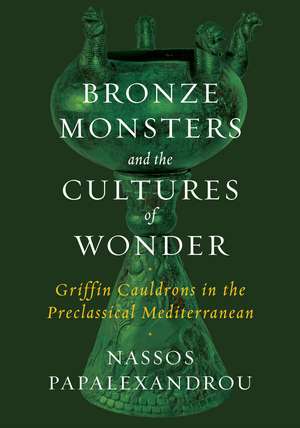Bronze Monsters and the Cultures of Wonder: Griffin Cauldrons in the Preclassical Mediterranean
Autor Nassos Papalexandrouen Limba Engleză Hardback – 23 noi 2021
The eighth and seventh centuries BCE were a time of flourishing exchange between the Mediterranean and the Near East. One of the period’s key imports to the Hellenic and Italic worlds was the image of the griffin, a mythical monster that usually possesses the body of a lion and the head of an eagle. In particular, bronze cauldrons bore griffin protomes—figurative attachments showing the neck and head of the beast. Crafted in fine detail, the protomes were made to appear full of vigor, transfixing viewers.
Bronze Monsters and the Cultures of Wonder takes griffin cauldrons as case studies in the shifting material and visual universes of preclassical antiquity, arguing that they were perceived as lifelike monsters that introduced the illusion of verisimilitude to Mediterranean arts. The objects were placed in the tombs of the wealthy (Italy, Cyprus) and in sanctuaries (Greece), creating fantastical environments akin to later cabinets of curiosities. Yet griffin cauldrons were accessible only to elites, ensuring that the new experience of visuality they fostered was itself a symbol of status. Focusing on the sensory encounter of this new visuality, Nassos Papalexandrou shows how spaces made wondrous fostered novel subjectivities and social distinctions.
Bronze Monsters and the Cultures of Wonder takes griffin cauldrons as case studies in the shifting material and visual universes of preclassical antiquity, arguing that they were perceived as lifelike monsters that introduced the illusion of verisimilitude to Mediterranean arts. The objects were placed in the tombs of the wealthy (Italy, Cyprus) and in sanctuaries (Greece), creating fantastical environments akin to later cabinets of curiosities. Yet griffin cauldrons were accessible only to elites, ensuring that the new experience of visuality they fostered was itself a symbol of status. Focusing on the sensory encounter of this new visuality, Nassos Papalexandrou shows how spaces made wondrous fostered novel subjectivities and social distinctions.
Preț: 518.98 lei
Nou
Puncte Express: 778
Preț estimativ în valută:
99.32€ • 107.85$ • 83.43£
99.32€ • 107.85$ • 83.43£
Carte indisponibilă temporar
Doresc să fiu notificat când acest titlu va fi disponibil:
Se trimite...
Preluare comenzi: 021 569.72.76
Specificații
ISBN-13: 9781477323618
ISBN-10: 1477323619
Pagini: 320
Ilustrații: 46 b&w photos, 11 b&w illus., 1 b&w map
Dimensiuni: 178 x 254 x 33 mm
Greutate: 1.79 kg
Editura: University of Texas Press
Colecția University of Texas Press
ISBN-10: 1477323619
Pagini: 320
Ilustrații: 46 b&w photos, 11 b&w illus., 1 b&w map
Dimensiuni: 178 x 254 x 33 mm
Greutate: 1.79 kg
Editura: University of Texas Press
Colecția University of Texas Press
Notă biografică
Nassos Papalexandrou is an associate professor of art history at the University of Texas at Austin. He is the author of The Visual Poetics of Power: Warriors, Youths, and Tripods in Early Greece.
Cuprins
- List of Illustrations
- Preface
- Acknowledgments
- Introduction
- Part I. Griffin Cauldrons in Contexts of Life and Death
- Chapter 1. Eastern Mediterranean, Ionia, and the Aegean
- Chapter 2. Mainland Greece
- Chapter 3. Italy and France
- Part II. Sources for the Lives of Griffin Cauldrons
- Chapter 4. Kolaios’s Monster Cauldron at the Heraion of Samos (Herodotus 4.152)
- Chapter 5. Monsters in Images: Pictorial Representations of Griffin Cauldrons
- Part III. Responses to the Uncanny
- Chapter 6. Vision of Wonders
- Conclusion. Disenchantment
- Notes
- References
- Index
Descriere
An enlightening study of griffin cauldrons in the pre-classical Mediterranean, uncovering the origins of illusionism in Greek art and exploring the social significance of a changing visual culture.
